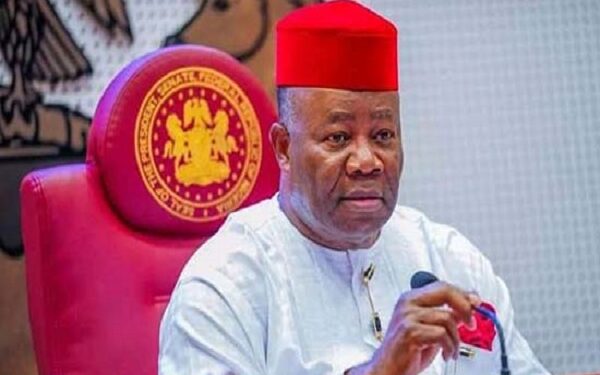The Senate President, on Tuesday, declared that “the proper use of the national budget is critical to the economic development of any country, and it is even more so for a nation like ours, where our economy needs urgent stimulation to address a myriad of challenges.”
This was even as he warned that the National Assembly would not tolerate lackadaisical attitude from government functionaries in all the Ministries, Departments and Agencies, about issues surrounding their defences of submissions and the resolve to maintain the January-December budget cycle.
Akpabio, who was represented by his deputy, Senator Jibrin Barau, spoke while declaring open a stakeholders retreat on the 2024 Appropriation Bill organised by the Senate Committee on Appropriations, chaired by Senator Solomon Adeola (APC Ogun West).

Barau said, “We understand that the budget is about fiscal targets, resource allocation, public expenditure policy, productivity and efficiency.
“We also understand that the process is one of passage, mobilisation and execution, as well as, effective monitoring and evaluation.”
The Senate President, however, warned that the consequences of an undefended budget “may not be palatable for the official or the agency in the eventual passage of the 2024 Appropriation Bill.”
He commended the zeal and foresight of the chairman and members of the Appropriations Committee, to open up the 2024 budget process for stakeholders’ engagement and feedback through this one-day retreat.
The Senate President said the contributions of stakeholders to lawmaking remain key elements in democracy, especially when it concerns a vital issue like the national budget of a nation dealing with the allocation of national resources.
Earlier, the chairman, Senate Committee on Appropriations, Senator Solomon Adeola, said the retreat would allow stakeholders to contribute meaningfully toward the realisation of the Renewed Hope Nudget 2024.
He said the National Assembly was committed to ensuring that there was value for every fund appropriated in the 2024 budget.
Also speaking, the Minister of Finance and Coordinating Minister for the Economy, Wale Edun, said Nigeria needs to explore climate financing to shore up revenue to fund the 2024 budget.
Edun, while acknowledging that Nigeria’s fiscal space was exhausted in line with the position of the International Monetary Fund, IMF, proposed a strategic shift towards concessional funding including climate financing as a viable solution.
“Nigeria’s fiscal space is exhausted, we have to focus on the concessional funding, the cheaper funding, even free funding and climate financing is the way.
“The solution is that we have to focus on concessional funding, the cheaper funding, even free funding, and climate financing is the way,” he stressed.
Edun pointed out that an estimated $1 trillion annually to be spent on climate change emphasised the significance of climate financing in funding the N27.5 trillion budget.
“Just yesterday UAE announced 30 billion dollars for climate action. What that means is that as we look to fund the N27.5 trillion budget this year, our first port of call must be the cheapest and the most concessionary financing including climate financing.
“We have to be brave, courageous, innovative to make sure that we use the financial market to take the stress down, to reduce our debt servicing, to reduce our emphasis on borrowing,” Edun said.
He highlighted the urgency of addressing the fiscal constraints and reducing dependence on borrowing particularly foreign borrowing.
The minister pointed out that an estimated $1 trillion annually to be spent on climate change emphasised the significance of climate financing in funding the N27.5 trillion budget.
In his lecture on the identification of processes to guide the desired achievement in the 2024 budget, gave an appraisal of the 2023 budget appraisal and 2024 proposal, a don in Economics, Professor Ayo Teriba, said the attainment and surpassing of the revenue of 2023 as at September was unprecedented and a great achievement for the current administration.
This, he said was an indication that the projected N18tn expected revenue in the 2024 budget was realistic.
Prof. Teriba also advised that tax revenue generation should not be the main focus of government toward revenue generation but efforts should be tailored to leveraging non-tax revenue, and asset revenue generation, with specific areas to attract foreign direct investments to increase revenue streams to the nation.
The economist said every MDA need to develop a workable window for creating opportunities for the inflow of domestic and foreign direct investments for sustainable revenue generation.
He also said that there was a need for more improvements in the capital component of the budget improve on its assets, and attract foreign direct investment.









